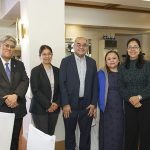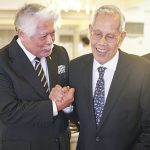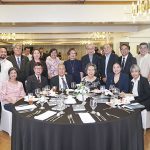The Philippine Bar Association (PBA) marked its 133rd Foundation Day and Law Day Celebration with a solemn and inspiring gathering held on 24 September 2025 at the Kamagong Room, Manila Golf & Country Club. The event brought together esteemed members of the legal profession to honor the PBA’s enduring legacy and reaffirm its commitment to justice and the rule of law.
The evening commenced with the Call to Order led by PBA President Joseph Manolo R. Rebano, and an Invocation delivered by Trustee Paul J. Bongco.
President Rebano welcomed guests with opening remarks that highlighted the association’s rich history and its pivotal role in shaping the legal landscape of the Philippines.
Trustee and Past President Jose Luis V. Agcaoili introduced the distinguished guests, setting the stage for the evening’s keynote segment. Dean Gwen Grecia De Vera of the U.P. College of Law introduced the Guest of Honor and Keynote Speaker, Hon. Vicente V. Mendoza, retired Associate Justice of the Supreme Court of the Philippines.
Justice Mendoza’s keynote address underscored the indispensable role of law in society, likening it to “the air we breathe.”
Justice Mendoza warned against the dangers of corruption, noting that a true government of laws must also be a government of principled individuals. He invoked the legacy of President Ramon Magsaysay, whose guiding principle was: “Those who have less in life should have more in law.” Justice Mendoza called for vigilance, reminding the audience of the maxim, “Quis custodiet ipsos custodes?” (“Who will guard the guards?”).
He called for vigilance against corruption and advocated for teaching law and civic responsibility early in schools. As he concluded, Justice Mendoza stated: “Government of laws, government of good men – that is what I believe we urgently need today.”
The evening was hosted by Trustees Erica Christel S. Patiño and Jose Martin A. Loon, with musical entertainment provided by the Manila String Machine, adding a graceful touch to the celebration.
The event was a testament to the PBA’s continued dedication to excellence, integrity, and service in the legal profession.
Government of Laws, Government of Men
Vicente V. Mendoza
It is a pleasure to join you in celebrating Law Day 2025. It is fitting that a day should be set aside to instill in our people an appreciation of the vital role of law in our social life. For law is like the air we breathe. Without it no living thing can survive. There ought to be a law!
Let us consider two situations, one which shows the necessity for law in social life and another one which shows what it would be like if there were no law. If a person finds a vacant lot and wants to build a house on it but another person wants it too, what do they need? A law, isn’t it? If a hospital has cardiac patients but a neighborhood is celebrating a fiesta and exploding firecrackers. what is needed? A law, isn’t it? If mass is being held at the Quiapo Church, but across Plaza Miranda neon signs brightly announce a burlesque show, what is needed? A law regulating the use of the plaza, isn’t it? And if a sugar mill is dumping waste matters into a creek and polluting a river, what is needed is a law, isn’t it? “Always a law,” as Justice Malcolm stressed in a case holding that that the mayor of Manila could not deport women of ill repute without the authority of law.
Second, what might it be like if there were no law? Let us consider now the case of the gold miners. They had been trapped inside the cave. by a landslide. They had been told by radio that without food they would likely die before they could be rescued. They therefore determined by throwing dice who would be killed and eaten so that others might live. Four were rescued and later prosecuted for murder and sentenced to death. On appeal to the Supreme Court, the five justices of the Court reached varying conclusions.
Chief Justice Truepenny voted to affirm the conviction and join a petition to the Executive to grant clemency to the defendants. He said the defendants were in a “state of nature” and the normal laws did not apply to them.
Justice Foster joined the petition on the ground that as the purpose of the criminal law is deterrence, this will not be served by affirming the conviction of the defendants.
Justice Tatting said he could not decide the case because there are other purposes of the criminal law, namely retribution and rehabilitation.
Justice Keen said the Court should take into account public opinion, 90 percent of which wanted lesser punishment for the defendants. Justice Handy thought the defendant should be acquitted because the Executive was not likely to grant them clemency. Unable to decide the case without a law, the justices were forced to dismiss the appeal.
“We will be truly civilized,” Paul Freund once said, “when the Supreme Court is no longer front-page news, when the judges need occupy no more exalted a place than . . . dentists, doing a bit of patchwork here and there, but not responsible for the basic health of the society.” That is when the government is a government of laws.
So that we may achieve such government, we elect representatives to make laws in Congress and require the President, as the highest magistrate of the land, to take an oath to “preserve and defend the Constitution and execute the laws.” But today we see government of laws submerged in a high tide of corruption. Money appropriated by law for the construction of flood controls is lost to unscrupulous contractors with the connivance of unscrupulous lawmakers. We see a horrifying reign of greed, of avarice.
A government of laws must also be a government of men. “Men,” as the poet Joshia Gilbert Holland prayed God, “whom the lust of office does not kill; Men whom the spoils of office cannot buy; Men who possess opinions and a will; Men who have honor, men who will not lie; Men who can stand before a demagogue; And damn his treacherous flatteries without winking! Tall men, sun-crowned, who live above the fog in public duty, and private thinking.”
Government of laws must also be government of men, such as was exemplified by the government of President Ramon Magsaysay, the humble mechanic from Zambales. Magsaysay’s guiding principle in life was: “Those who have less in life should have more in law,” and “Can we defend this in Plaza Miranda?” He knew that law, as instrument of social action, can be used for good or ill, and he used it for good.
We cannot always have a Magsaysay, and we should ever be on our guard always, lest those to whom we entrust the enforcement of our laws betray our trust. The familiar maxim “Quis custodiet ipsos custodes?” (“Who will guard the guards?”) should be a constant reminder to us to be vigilant.
What can we do as citizens? We must begin by teaching law early in life. We must teach it in the grade schools and high schools. Students should be made to read the Bill of Rights and then asked simple problems based on it, like “What do you do if, while mass is being held at the Quiapo Church, a mobile cart across Plaza Miranda is blaring some commercial products?” This will engage the students’ interest and make them see that the problem is not so much right versus wrong as it is right versus right: the right of an individual to freedom of expression versus the government’s right to maintain public order, the right of an individual to privacy of communication and correspondence versus effective law enforcement, the right of the individual to travel versus the government’s right to safeguard national security.
Law is full of ethical principles which can be explored for their civilizing effect. If taught law is in this manner, our people will become more restrained in their action. They will become more mindful and respectful of the rights of others, and they will become truly civilized individuals.
Let me conclude with the hope that Law Day celebrations, like today’s celebration, focus on the need for making government of laws government of good men as well, to prepare our people for which, law should be taught in the grade schools and high schools. Government of laws, government of good men – that is what I believe we urgently need today.

















































